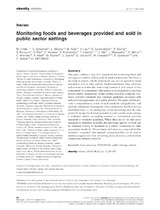Monitoring foods and beverages provided and sold in public sector settings
Date
2013Author
L’Abbé, M.
Schermel, A.
Sanders, David
Minaker, L.
Kelly, B.
Lee, A.
Vandevijvere, S.
Twohig, P.
Barquera, S.
Friel, S.
Hawkes, Corinna
Kumanyika, S.
Lobstein, T.
Ma, J.
Macmullan, J.
Mohan, S.
Monteiro, Carlos
Neal, B.
Rayner, M.
Sacks, G.
Snowdon, W.
Swinburn, B.
Walker, C.
Metadata
Show full item recordAbstract
This paper outlines a step-wise framework for monitoring foods and
beverages provided or sold in publicly funded institutions. The focus is
on foods in schools, but the framework can also be applied to foods
provided or sold in other publicly funded institutions. Data collection
and evaluation within this monitoring framework will consist of two
components. In component I, information on existing food or nutrition
policies and/or programmes within settings would be compiled. Currently,
nutrition standards and voluntary guidelines associated with
such policies/programmes vary widely globally. This paper, which provides
a comprehensive review of such standards and guidelines, will
facilitate institutional learnings for those jurisdictions that have not yet
established them or are undergoing review of existing ones. In component
II, the quality of foods provided or sold in public sector settings
is evaluated relative to existing national or sub-national nutrition
standards or voluntary guidelines. Where there are no (or only poor)
standards or guidelines available, the nutritional quality of foods can
be evaluated relative to standards of a similar jurisdiction or other
appropriate standards. Measurement indicators are proposed (within
‘minimal’, ‘expanded’ and ‘optimal’ approaches) that can be used to
monitor progress over time in meeting policy objectives, and facilitate
comparisons between countries.

